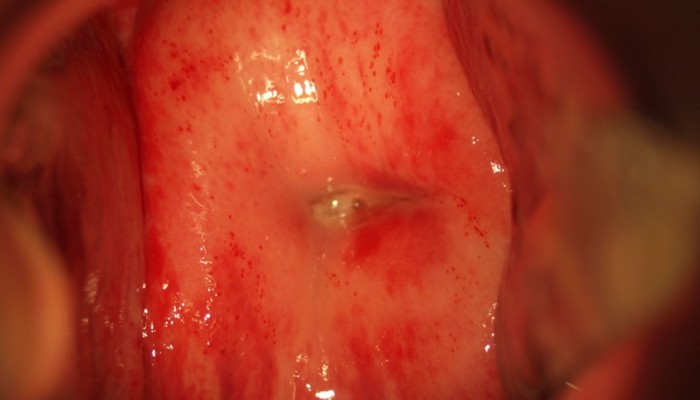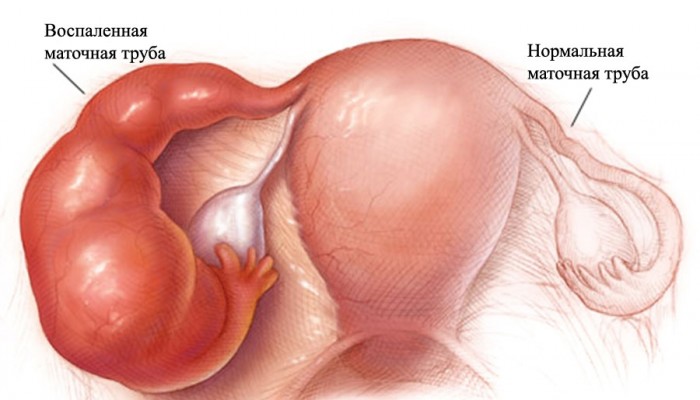A common problem in gynecology is an unpleasant odor from the vagina. It can bother women of all ages, often occurring during pregnancy. Sometimes this becomes a real problem - the smell from an intimate place interferes with sexual life and causes not only physical, but also obvious psychological discomfort. This situation makes you think about the factors that are able to provoke its development, because everyone wants to get rid of the unpleasant manifestation. And without knowing the reasons, it will not be possible to carry out adequate treatment.
Causes
When an extraneous odor appears from the vagina, then women first of all think about some kind of disease. This is usually the case. But sometimes such a symptom can confirm metabolic changes at certain periods of life (for example, during pregnancy) or speak of increased secretion of the vaginal glands. But most often, the appearance of the smell is associated with inflammatory processes. Since the mucous membrane of the vagina is in contact with the external environment, the penetration and reproduction of microbes in it often manifests itself as such a symptom.
The main factors that can cause different vaginal odor include the following conditions:
- Vaginal dysbiosis.
- Colpitis.
- Specific infections.
- Endocrine diseases.
- Inflammatory pathology of the uterus and appendages.
- Pregnancy.
- Menses.
This is largely due to the violation of the rules of personal hygiene and promiscuous sexual intercourse among women. Why such a symptom actually appears can only be determined by a doctor. However, the woman herself is able to guess what caused the smell. It is enough just to assess the possibility of the impact of certain factors. But this can be most accurately said after a medical examination with the use of additional diagnostic methods.
Without eliminating the causes of the unpleasant odor, it will be extremely difficult to get rid of it. And in order to prevent its appearance, it is worth observing basic hygiene rules.
Symptoms
Vaginal odor is just a separate symptom. It is impossible to talk about any pathology only on its basis. Moreover, it can confuse the diagnostic process. Although some pathology is accompanied by the appearance of a specific odor, it will only make it possible to make a certain assumption. And the final conclusion can be formed after a comprehensive examination.
It should be borne in mind that an unpleasant odor from the vagina can have different shades:
- Rotten.
- Sour.
- Putrefactive.
- Sweet.
- Fish (herrings).
- Acetone.
- Luke.
- Sperm.
It is worth paying attention to other symptoms that a woman will inevitably feel along with an unpleasant odor. As a rule, discharge of a different nature appears. It may also be disturbing to feel a burning or itching sensation in the vagina, which is often worse after sex.
Of great importance during a medical examination is the differential diagnosis of possible pathology.
Vaginal dysbiosis
Normally, the vaginal environment mainly contains lactobacilli (Doderlein's sticks), which create an acidic reaction. This is a protective factor against pathogenic microorganisms. But at the same time, in healthy women, other bacteria, called transient, are also inconsistently present in the vagina, but they are in negligible quantities: gardnerella, bacteroids, peptostreptococcus. If for some reason the number of lactic acid sticks decreases, this flora takes their place, which leads to a change in the properties of vaginal secretions, including odor.
Assuming vaginal dysbiosis (bacterial vaginosis), you may notice the following:
- The smell of rotten fish or herring.
- Profuse grayish-white discharge.
- There is no inflammatory process.
- The vaginal environment becomes alkaline.
If earlier bacterial vaginosis was considered as an altered state of the vaginal microflora, now many doctors agree on the need for active treatment of this process. This position is based on the risk of developing inflammatory diseases not only of the external, but also of the internal genital organs in women, including specific infections. In addition, there is the possibility of infection in a sexual partner and certain complications during pregnancy.
If vaginal odor is associated with dysbiosis, then it should also be treated. After the normalization of microflora, the symptoms disappear without a trace.
Colpitis
Nonspecific inflammation of the vaginal mucosa occurs under the influence of such microbes: staphylococcus, Escherichia coli, streptococcus or Proteus. Most often it occurs in women of reproductive age, but it can also be observed in the elderly, children, and also during pregnancy.
Colpitis occurs in the form of an acute, subacute or chronic process. Symptoms of pathology are determined by the type of pathogen, severity and clinical course of the disease. If we talk about acute colpitis, then the following symptoms will be observed:
- Profuse smelly mucous or mucopurulent discharge.
- Itching and burning in the vagina.
- Discomfort in the lower abdomen.
- Cutting during urination.
During a medical examination, changes in the mucous membrane of the genital organs are visible - hyperemia and swelling. However, it can bleed easily and is painful with various manipulations. The unpleasant sensations intensify during and after sex.
An unpleasant odor from the vagina indicates the need to be examined for nonspecific colpitis.
Specific infections

If a woman senses a strong odor from the genital tract, you need to think about the possibility of some kind of infection. Especially if specific symptoms appear that can lead to a similar assumption. If it smells unpleasant in the intimate area, you need to see if there is pathological discharge. As a rule, it is they who can speak eloquently about a possible pathogen. So, depending on the pathology, the discharge takes on the following character:
- Scanty white-yellow color and creamy consistency - with gonorrhea.
- Liquid foamy, yellow-green in color - with trichomoniasis.
- White cheesy, in the form of plaque - with candidiasis.
- Abundant whitish, creamy discharge with a fish smell - with gardnerellosis.
Most often, this situation is observed after unprotected intercourse or during infection in a domestic environment. As a rule, all such diseases are accompanied by itching and burning sensation in the vagina, reddening of the mucous membrane, and impaired urination.
Quite often, intracellular pathogens are found: chlamydia, mycoplasma, ureaplasma. However, such infections do not have a specific clinical picture and are often asymptomatic. Therefore, they need to be purposefully identified, especially when planning a pregnancy.
It must be remembered that specific infections can spread to the internal genital organs of women and cause infertility.
Endocrine diseases
If there is a smell of acetone from the vagina, then you should think about diabetes. With an increase in the woman's body of ketone bodies that accumulate as a result of impaired glucose utilization, they can also be released through the mucous membranes in the intimate area. When it smells like acetone, you need to pay attention to other symptoms that speak of diabetes mellitus:
- Dry mouth and thirst.
- Excretion of a large amount of urine (polyuria).
- Weight gain or emaciation.
In addition, dry skin may disturb, and with a prolonged course of the disease, vision decreases, the function of the kidneys, nervous and cardiovascular systems is impaired. Diabetes mellitus can also cause placental complications during pregnancy.
Inflammatory pathology of the uterus and appendages

When the inflammatory process affects the internal genital organs of women, then a scanty vaginal discharge may appear, which also smells unpleasant. But other signs will be more important in this case:
- Pain in the lower abdomen.
- Violation of the menstrual cycle.
- Soreness during sexual intercourse.
- Increased body temperature.
- Infertility.
Inflammatory diseases of the uterus and appendages should be treated in time, since this will not only get rid of the unpleasant odor, but also return the opportunity to become pregnant.
Pregnancy

During pregnancy, hormonal changes occur in a woman's body, which can also affect the vaginal mucosa and her glands. At the same time, the smell becomes sharper, but it must be remembered that there should be no signs of inflammation.
When a woman's immune system is weakened when carrying a child, vaginal dysbiosis may develop, when a transient or brightly pathogenic microflora takes the place of normal microflora. An increased risk of exacerbation of chronic gynecological pathology should also be expected.
After childbirth, the number of bloody discharge increases, which still does not have an unpleasant odor. If a woman doubts certain symptoms, then she should see a doctor.
Menses
An equally important place in determining why there is an unpleasant odor from the genital tract is the establishment of its connection with menstruation. However, there are several factors supporting this scenario. First of all, menstruation is always accompanied by a weakening of the body's defenses, against which an infection can join. Secondly, the blood itself, which is a breeding ground for the reproduction of microorganisms, contributes to the rapid development of inflammation. And improper use of personal hygiene products only aggravates these processes.
If, after menstruation, a foreign smell from the genital tract is worried, then you need to consult a doctor. He will prescribe a treatment that will quickly get rid of such a symptom.
Treatment

It is necessary to treat various conditions taking into account all etiological moments. You can only hope for a successful cure if the cause is eliminated. To remove an unpleasant odor, modern gynecology has great opportunities. And they include not only candles or douching, but also means of general exposure. Conservative therapy is mainly used, which shows pronounced results in a short time. In addition, preventive measures cannot be neglected.
To minimize the possibility of microflora disorders and help in the treatment of various diseases, you should follow simple rules for maintaining a healthy lifestyle. This will reduce the risk of the spread of the pathology and prevent its development in the future. So, a woman needs to adhere to the following recommendations:
- Eat right with the presence of fruits, vegetables, herbs, dairy products in the diet.
- Drink plenty of fluids.
- Wear underwear made from natural fabrics.
- Take a daily shower, wash yourself more often.
- Change sanitary napkins every 2 hours during your period.
But with a diagnosed disease, such measures should be used in combination with other therapeutic agents.
Drug therapy

The use of drugs is the basis for the treatment of many diseases. The use of tablets, suppositories or solutions helps to get rid of an unpleasant odor from the genital tract and no longer feel it. In this case, the following groups of drugs can be used:
- Antibiotics
- Anti-inflammatory.
- Hormones.
- Antiseptics.
- Vitamins.
- Adaptogens.
During pregnancy, great importance is attached to the safety of medicines for the fetus. In this case, local medications are often used: vaginal suppositories, douching, baths. But in any case, it is unacceptable to treat the disease on your own.
The smell from the genital tract causes a lot of trouble for women of all ages. To overcome an unpleasant symptom, you need to see a doctor on time and carry out adequate treatment.